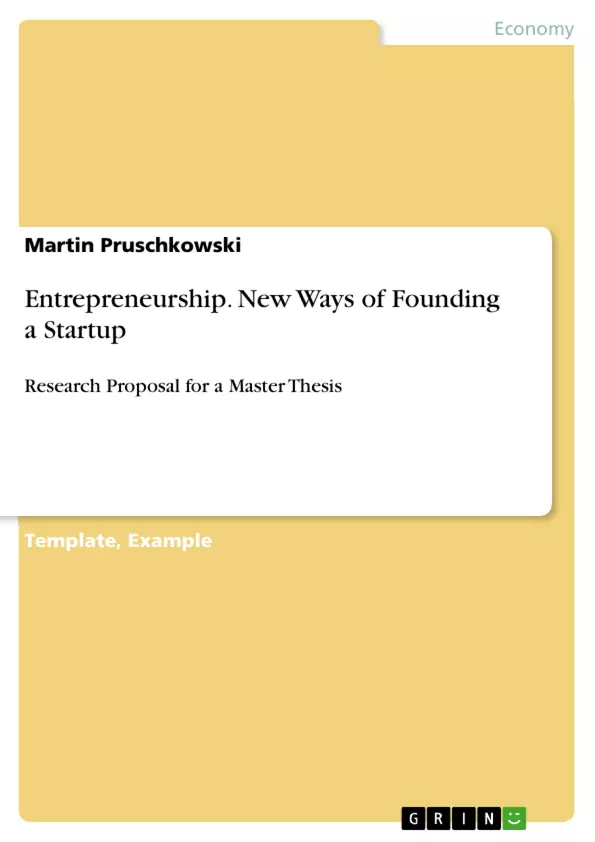This paper is a preparation for a Master Thesis, not the final thesis. A structure and several leading questions regarding the topic of entrepreneurship and start-ups are proposed. An insight into the current field of study is given. The paper may help in the formulation of own research proposals.
Inhaltsverzeichnis (Table of Contents)
- Introduction
- Existing Knowledge
- Concept of Entrepreneurship
- Derivation
- Delimitation to other terms
- Definition
- Concept of Startup
- Business foundations in Germany
- Concept of Entrepreneurship
- Research question and objectives
- Structure and methodology
- Data collection
- Timescale
- Resources
Zielsetzung und Themenschwerpunkte (Objectives and Key Themes)
This research proposal aims to investigate new ways of founding a startup. The study will explore the existing knowledge on entrepreneurship and startups, specifically within the German context. It will then define the research question and outline the methodology for data collection and analysis.
- Concept of Entrepreneurship
- Concept of Startup
- Business Foundations in Germany
- Research Methodology
- Startup Founding Processes
Zusammenfassung der Kapitel (Chapter Summaries)
Introduction: This introductory chapter sets the stage for the research proposal by briefly outlining the topic of entrepreneurship and new startup founding methods. It establishes the context for the research by mentioning the location and program of study. While not explicitly stated, it implicitly suggests an interest in understanding the current landscape of startup creation and the factors contributing to its success or failure.
Existing Knowledge: This chapter delves into the theoretical foundations of the research by exploring existing literature on entrepreneurship and startups. It aims to define and delineate the concept of entrepreneurship, differentiating it from related terms. Further, it examines the concept of a startup and the specific business environment and regulations in Germany. This lays the groundwork for a detailed analysis of the chosen research subject, providing a solid base of existing knowledge to inform the research question and methodology.
Research question and objectives: This chapter clearly articulates the central research question guiding the study, explicitly stating the objectives and goals to be achieved through the research. It establishes a clear focus for the investigation, setting the boundaries and scope of the research project within the broader context of entrepreneurship and startup founding.
Structure and methodology: This chapter outlines the detailed plan for conducting the research. It describes the methods for data collection, the proposed timeline for completing the project, and the resources required to undertake the study. This section provides a practical roadmap for the execution of the research, clarifying the steps involved and ensuring the efficient and effective achievement of the defined objectives.
Schlüsselwörter (Keywords)
Entrepreneurship, Startup, Germany, Business Foundations, Research Methodology, Startup Founding, Data Collection.
Frequently Asked Questions: Comprehensive Language Preview of Startup Founding in Germany
What is the overall purpose of this document?
This document serves as a comprehensive language preview for a research proposal investigating new ways of founding startups in Germany. It provides a detailed overview of the research, including the table of contents, objectives, key themes, chapter summaries, and keywords.
What topics are covered in the "Existing Knowledge" section?
The "Existing Knowledge" section explores the theoretical foundations of the research by examining existing literature on entrepreneurship and startups. It defines and differentiates the concept of entrepreneurship from other related terms, examines the concept of a startup, and details the business environment and regulations in Germany.
What is the main research question addressed in this proposal?
While the exact research question isn't explicitly stated in this preview, the document indicates the research aims to investigate new ways of founding a startup, focusing on the German context. The specific research question and objectives are detailed in a dedicated chapter.
What methodology is used in this research?
The methodology section outlines the plan for conducting the research, including the methods for data collection, the project timeline, and the required resources. Specific methods are not detailed in this preview but are described in the full proposal.
What are the key themes explored in this research?
Key themes include the concept of entrepreneurship, the concept of a startup, business foundations in Germany, research methodology, and startup founding processes.
What is the structure of the research proposal?
The research proposal is structured into the following chapters: Introduction, Existing Knowledge, Research Question and Objectives, and Structure and Methodology. Each chapter is summarized in this preview.
What are the keywords associated with this research?
The keywords are: Entrepreneurship, Startup, Germany, Business Foundations, Research Methodology, Startup Founding, and Data Collection.
Where can I find more details about the research?
This document is a preview. The complete research proposal will provide further details on the research question, methodology, findings, and conclusions.
What is the target audience for this document?
The target audience is likely academics and researchers interested in entrepreneurship, startups, and the German business environment. The document's focus on structured analysis and professional presentation points to an academic setting.
What is the German context of this research?
The research specifically focuses on the German context, examining the business foundations, regulations, and environment relevant to startup founding within Germany. This is highlighted throughout the preview.
- Quote paper
- Martin Pruschkowski (Author), 2015, Entrepreneurship. New Ways of Founding a Startup, Munich, GRIN Verlag, https://www.grin.com/document/432965



